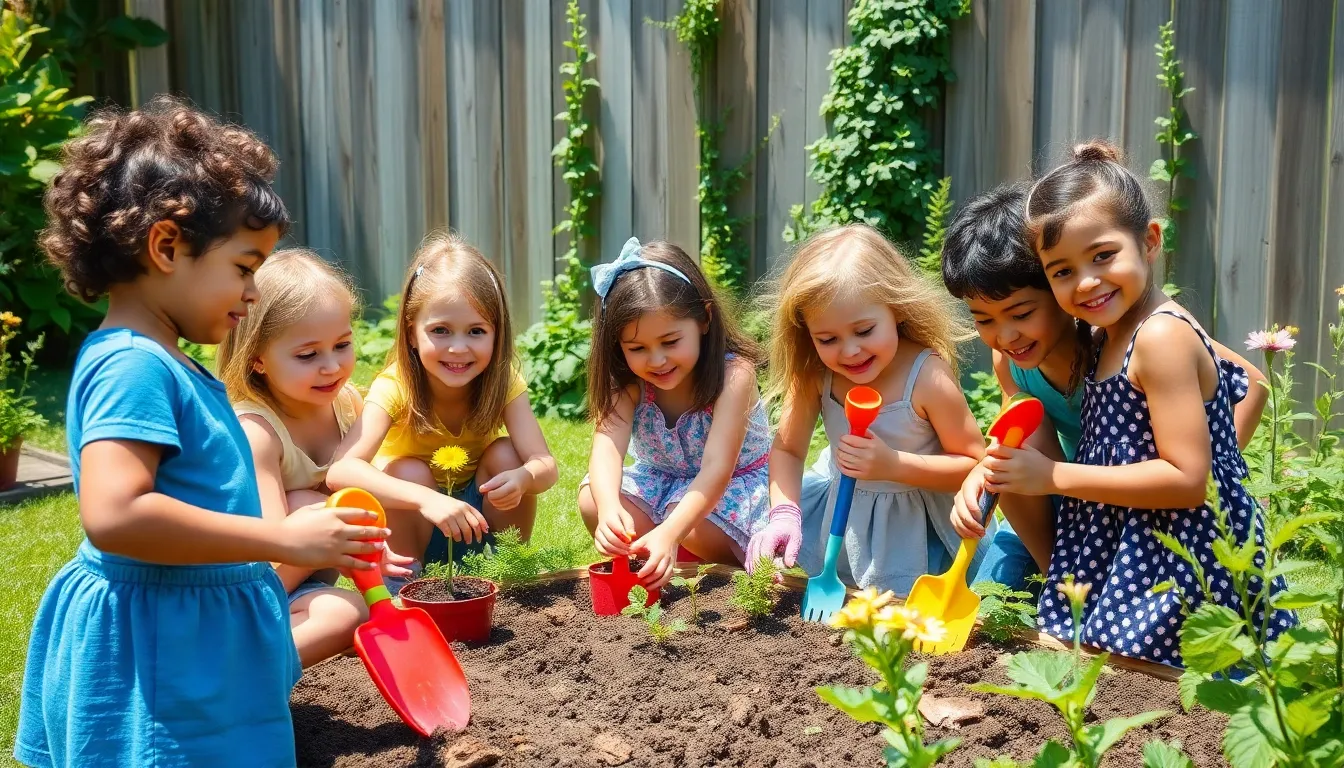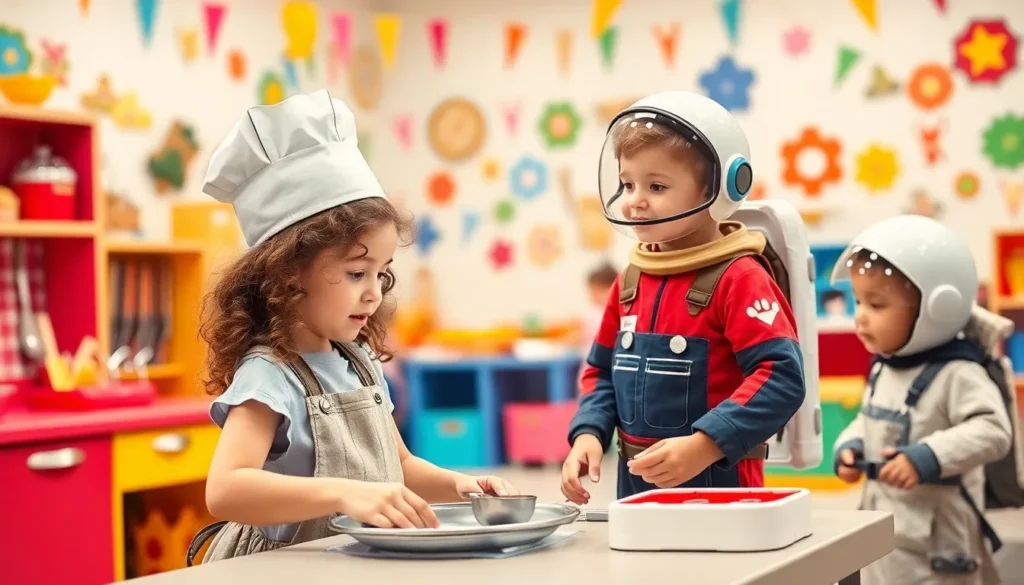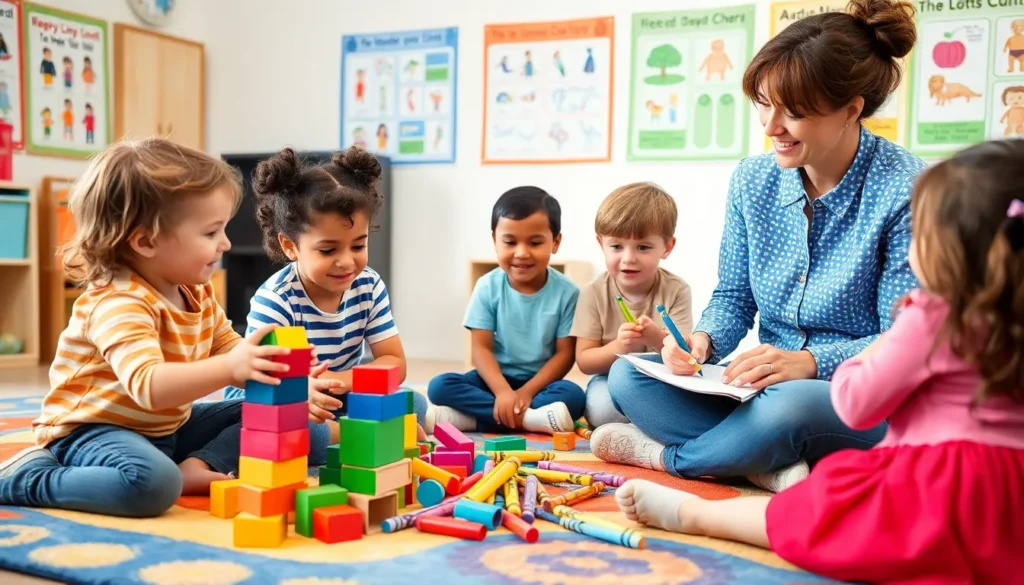Table of Contents
ToggleImagine a world where kids swap screens for sunshine and dirt. Garden play activities are the ultimate antidote to boredom, transforming any backyard into a vibrant playground. Not only do these activities spark creativity but they also get little ones moving, learning, and laughing.
Overview of Garden Play Activities
Garden play activities offer diverse opportunities for children to learn and explore. Engaging in these activities promotes physical fitness, cognitive development, and social interaction. Various options exist, ensuring that every child can find something enjoyable.
Exploratory play leads children to discover unique plants and insects, fostering curiosity. Nature scavenger hunts encourage teamwork, allowing kids to collaborate while searching for specific items like leaves or flowers.
Creative play includes activities such as painting rocks or building fairy houses, which stir imagination. Gardening itself provides practical knowledge about plants, teaching kids how to care for living things.
Structured games like tag and hide-and-seek incorporate elements of fun and competition, offering exercise while engaging with nature. Furthermore, incorporating educational workshops on topics like composting and sustainability adds depth to outdoor play.
Crafts using natural materials further enhance creativity, allowing children to create art from their surroundings. Using sticks, leaves, and stones as materials makes for great expression and creativity.
Playtime can also involve sensory exploration through activities like mud play or water games, which stimulate tactile experiences. Arranging obstacle courses can promote physical challenges, helping develop motor skills and coordination.
These diverse garden play activities not only entertain but also build critical life skills. Children who engage in outdoor play often develop a stronger connection to nature, instilling a sense of responsibility toward the environment.
Benefits of Garden Play Activities

Garden play activities offer numerous advantages that contribute to a child’s overall development. Engaging in outdoor play promotes various skills while connecting children to nature.
Physical Development
Physical development occurs through active participation in garden play. Activities like running, climbing, and jumping enhance gross motor skills. Fine motor skills also improve when children dig, plant seeds, and manipulate tools. Research indicates that outdoor play strengthens muscles and builds endurance, essential for maintaining a healthy lifestyle. Additionally, regular physical activity helps in developing coordination and balance, enabling children to gain confidence in their abilities. The myriad of movements involved in gardening keeps kids active and engaged, fostering lifelong habits of fitness.
Cognitive Growth
Cognitive growth flourishes as children explore garden environments. Problem-solving skills sharpen when kids figure out how to nurture plants or construct garden structures. Gardening stimulates curiosity and encourages observational skills, as children learn about various plant species and ecosystems. Engaging in nature-related play enhances critical thinking abilities and creativity, which can translate into academic success. Interactive activities like scavenger hunts or building projects foster a hands-on learning experience that aids memory retention and information processing. These cognitive benefits provide a strong foundation for future learning.
Social Skills Enhancement
Social skills enhancement takes place during collaborative garden play. Children learn to work together while tackling tasks such as planting or building a garden bed. Teamwork fosters communication, negotiation, and sharing among peers, creating opportunities for building lasting friendships. When kids engage in structured games based in the garden, they practice important social dynamics like turn-taking and empathy. Conflict resolution often arises during interactions, teaching children how to navigate disagreements positively. Additionally, community gardening projects help children feel more connected to their peers and local environments, further enriching their social experiences.
Types of Garden Play Activities
Numerous garden play activities engage children in meaningful exploration and creativity. These activities encourage physical, cognitive, and social development.
Sensory Play
Sensory play involves hands-on experiences that stimulate children’s senses. Activities like digging in the soil, feeling different textures of leaves and flowers, or playing with water provide rich tactile experiences. Children explore scents from herbs and plants while developing fine motor skills through pouring, mixing, and molding. Engaging with natural materials fosters curiosity and encourages imaginative play, allowing children to create their own games. This type of play enhances their sensory awareness, leading to deeper connections with their surroundings.
Gardening Projects
Gardening projects present children with opportunities to learn about plants and the environment. Activities such as planting seeds, watering gardens, and caring for plants teach responsibility. Kids gain insights into the growth cycles of flowers, vegetables, and herbs, promoting a sense of accomplishment as they observe their work flourish. Projects can include creating container gardens or building raised beds, encouraging teamwork and collaboration. These projects cultivate an understanding of sustainable practices and the importance of caring for living things.
Nature Exploration
Nature exploration encourages children to discover wildlife in their garden environments. Activities like nature scavenger hunts help kids identify various plants and insects, sparking curiosity about ecosystems. Walking along paths or through garden beds promotes physical activity while deepening their appreciation for biodiversity. Parents can guide discussions on the roles of different organisms, enhancing critical thinking. Observing seasonal changes develops awareness of natural cycles, fostering a connection to the environment and its wonders.
Tips for Implementing Garden Play Activities
Implementing garden play activities involves several key considerations to maximize engagement and safety.
Choosing the Right Location
Selecting an ideal garden spot plays a crucial role. The area should be safe, sunny, and easily accessible to children. Look for flat ground, free from hazards like sharp objects or toxic plants. Choose locations near adult supervision for added safety. Additionally, consider proximity to educational resources, which can enhance the learning experience.
Safety Considerations
Prioritizing safety ensures a positive experience. It’s vital to use non-toxic materials for any crafts or activities. Check for potential hazards such as poisonous plants and stagnant water. Establish boundaries to keep children within a designated safe area. Basic first-aid supplies should remain on hand for minor injuries. Encourage children to wear appropriate clothing and footwear to protect against sun or insects.
Engaging with Children
Engaging with children enhances their enjoyment and participation. Start by introducing activities that match their interests, whether gardening or creating art. Encourage sharing ideas and facilitate group collaboration for projects. Ask open-ended questions to stimulate curiosity about nature. Celebrate their small achievements to foster confidence. Regularly rotate activities to maintain excitement and introduce new challenges.
Embracing garden play activities opens up a world of possibilities for children. These experiences not only foster creativity and physical development but also nurture essential social skills. By engaging in outdoor play, kids build a lasting connection with nature, enhancing their appreciation for the environment.
Incorporating diverse activities ensures that every child can find joy and learning in the garden. From sensory exploration to collaborative games, each moment spent outdoors contributes to their overall growth. Prioritizing safety and engagement makes these activities even more rewarding. Ultimately, garden play is a powerful tool for enriching children’s lives and instilling a sense of responsibility toward the planet.










